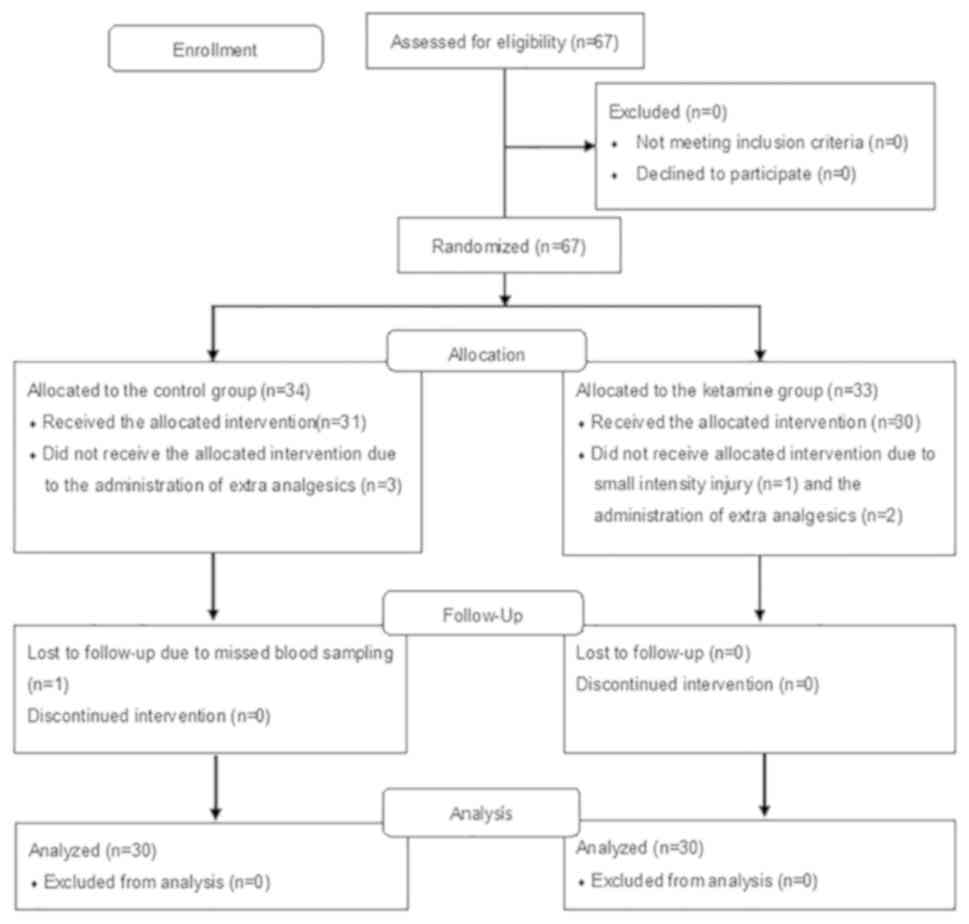|
1
|
Wall T, Sherwin A, Ma D and Buggy DJ:
Influence of perioperative anaesthetic and analgesic interventions
on oncological outcomes: A narrative review. Br J Anaesth.
123:135–150. 2019.PubMed/NCBI View Article : Google Scholar
|
|
2
|
Ní Eochagáin A, Burns D, Riedel B, Sessler
DI and Buggy DJ: The effect of anaesthetic technique during primary
breast cancer surgery on neutrophil-lymphocyte ratio,
platelet-lymphocyte ratio and return to intended oncological
therapy. Anaesthesia. 73:603–61. 2018.PubMed/NCBI View Article : Google Scholar
|
|
3
|
Yoo S, Lee HB, Han W, Noh DY, Park SK, Kim
WH and Kim JT: Total intravenous anesthesia versus inhalation
anesthesia for breast cancer surgery: A retrospective cohort study.
Anesthesiology. 130:31–40. 2019.PubMed/NCBI View Article : Google Scholar
|
|
4
|
Sessler DI and Riedel B: Anesthesia and
cancer recurrence: Context for divergent study outcomes.
Anesthesiology. 130:3–5. 2019.PubMed/NCBI View Article : Google Scholar
|
|
5
|
Forget P, Aguirre JA, Bencic I, Borgeat A,
Cama A, Condron C, Eintrei C, Eroles P, Gupta A, Hales TG, et al:
How anesthetic, analgesic and other non-surgical techniques during
cancer surgery might affect postoperative oncologic outcomes: A
summary of current state of evidence. Cancers (Basel). 11:
pii(E592)2019.PubMed/NCBI View Article : Google Scholar
|
|
6
|
Pérez-González O, Cuéllar-Guzmán LF, Soliz
J and Cata JP: Impact of regional anesthesia on recurrence,
metastasis, and immune response in breast cancer surgery: A
systematic review of the literature. Reg Anesth Pain Med.
42:751–756. 2017.PubMed/NCBI View Article : Google Scholar
|
|
7
|
Wigmore TJ, Mohammed K and Jhanji S:
Long-term survival for patients undergoing volatile versus IV
anesthesia for cancer surgery: A retrospective analysis.
Anesthesiology. 124:69–79. 2016.PubMed/NCBI View Article : Google Scholar
|
|
8
|
Boland JW and Pockley AG: Influence of
opioids on immune function in patients with cancer pain: From bench
to bedside. Br J Pharmacol. 175:2726–2736. 2018.PubMed/NCBI View Article : Google Scholar
|
|
9
|
Jiang S, Liu Y, Huang L, Zhang F and Kang
R: Effects of propofol on cancer development and chemotherapy:
Potential mechanisms. Eur J Pharmacol. 831:46–51. 2018.PubMed/NCBI View Article : Google Scholar
|
|
10
|
Faul F, Erdfelder E, Buchner A and Lang
AG: Statistical power analyses using G*Power 3.1: Tests for
correlation and regression analyses. Behav Res Methods.
41:1149–1160. 2009.PubMed/NCBI View Article : Google Scholar
|
|
11
|
Bentley MW, Stas JM, Johnson JM, Viet BC
and Garrett N: Effects of preincisional ketamine treatment on
natural killer cell activity and postoperative pain management
after oral maxillofacial surgery. AANA J. 73:427–436.
2005.PubMed/NCBI
|
|
12
|
Liu FL, Chen TL and Chen RM: Mechanisms of
ketamine-induced immunosuppression. Acta Anaesthesiol Taiwan.
50:172–177. 2012.PubMed/NCBI View Article : Google Scholar
|
|
13
|
Heaney A and Buggy DJ: Can anaesthetic and
analgesic techniques affect cancer recurrence or metastasis? Br J
Anaesth. 109 (Suppl 1):i17–i28. 2012.PubMed/NCBI View Article : Google Scholar
|
|
14
|
Melamed R, Bar-Yosef S, Shakhar G, Shakhar
K and Ben-Eliyahu S: Suppression of natural killer cell activity
and promotion of tumor metastasis by ketamine, thiopental, and
halothane, but not by propofol: Mediating mechanisms and
prophylactic measures. Anesth Analg. 97:1331–1339. 2003.PubMed/NCBI View Article : Google Scholar
|
|
15
|
Forget P, Collet V, Lavand'homme P and De
Kock M: Does analgesia and condition influence immunity after
surgery? Effects of fentanyl, ketamine and clonidine on natural
killer activity at different ages. Eur J Anaesthesiol. 27:233–240.
2010.PubMed/NCBI View Article : Google Scholar
|
|
16
|
Beilin B, Rusabrov Y, Shapira Y, Roytblat
L, Greemberg L, Yardeni IZ and Bessler H: Low-dose ketamine affects
immune responses in humans during the early postoperative period.
Br J Anaesth. 99:522–527. 2007.PubMed/NCBI View Article : Google Scholar
|
|
17
|
Sengupta S, Ghosh S, Rudra A, Kumar P,
Maitra G and Das T: Effect of ketamine on bispectral index during
propofol-fentanyl anesthesia: A randomized controlled study. Middle
East J Anaesthesiol. 21:391–395. 2011.PubMed/NCBI
|
|
18
|
Phillips W, Anderson A, Rosengreen M,
Johnson J and Halpin J: Propofol versus propofol/ketamine for brief
painful procedures in the emergency department: Clinical and
bispectral index scale comparison. J Pain Palliat Care
Pharmacother. 24:349–355. 2010.PubMed/NCBI View Article : Google Scholar
|
|
19
|
Cronin AJ, Aucutt-Walter NM, Budinetz T,
Bonafide CP, DiVittore NA, Gordin V, Schuler HG and Bonneau RH:
Low-dose remifentanil infusion does not impair natural killer cell
function in healthy volunteers. Br J Anaesth. 91:805–809.
2003.PubMed/NCBI View Article : Google Scholar
|
|
20
|
Moyano J and Aguirre L: Opioids in the
immune system: From experimental studies to clinical practice. Rev
Assoc Med Bras (1992). 65:262–269. 2019.PubMed/NCBI View Article : Google Scholar
|
|
21
|
Sacerdote P, Gaspani L, Rossoni G, Panerai
AE and Bianchi M: Effect of the opioid remifentanil on cellular
immune response in the rat. Int Immunopharmacol. 1:713–719.
2001.PubMed/NCBI View Article : Google Scholar
|
|
22
|
Angka L, Khan ST, Kilgour MK, Xu R,
Kennedy MA and Auer RC: Dysfunctional natural killer cells in the
aftermath of cancer surgery. Int J Mol Sci. 8:
pii(E1787)2017.PubMed/NCBI View Article : Google Scholar
|
|
23
|
Bakos O, Lawson C, Rouleau S and Tai LH:
Combining surgery and immunotherapy: Turning an immunosuppressive
effect into a therapeutic opportunity. J Immunother Cancer.
6(86)2018.PubMed/NCBI View Article : Google Scholar
|















